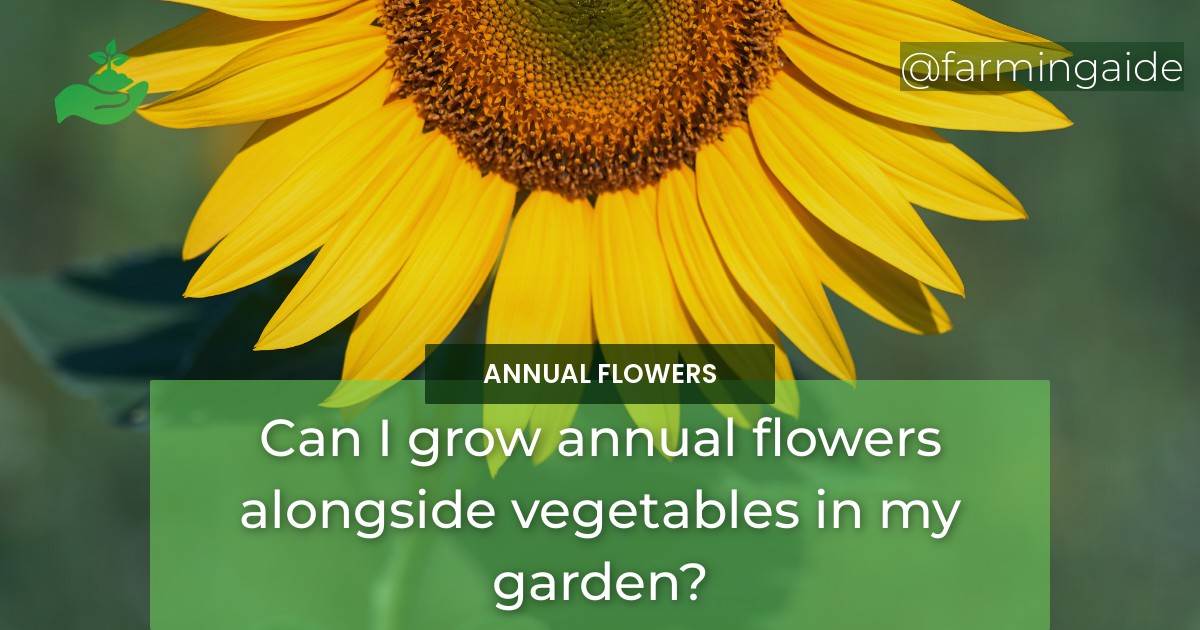Yes, you can undoubtedly grow annual flowers alongside vegetables in your garden. Interplanting is an effective method of growing different types of plants together in one garden, and it can provide numerous benefits. Growing annual flowers in your vegetable garden not only adds beauty and color but also attracts pollinators, controls pests, and improves soil health.
Benefits of Interplanting Annual Flowers with Vegetables
Pest Control
Interplanting flowers with vegetables can help repel pests. Marigolds, for example, release a scent that repels nematodes, whiteflies, and other harmful insects. Nasturtiums are also excellent in controlling aphids and beetles.
Pollination
Most fruiting vegetables require pollination to produce. Interplanting with annual flowers can help attract pollinators like bees, butterflies, and hummingbirds, which will increase the yield of your crops.
Soil Health
Annual flowers can help improve soil health. Plants like clover, vetch, and peas have the ability to fix nitrogen into the soil, enriching it with nutrients. Additionally, flowers with deep tap roots like sunflowers can help break up compacted soil.
Aesthetics
Interplanting annual flowers with vegetables can make your garden more visually appealing. Flowers like petunias, zinnias, and cosmos add vibrant colors, texture, and height variation to your garden.
Companion Planting Suggestions
Marigolds
- Repels harmful insects
- Attracts pollinators
- Improves soil health
- Complements tomatoes, peppers, and eggplants
Nasturtiums
- Repels aphids and beetles
- Attracts pollinators
- Edible flowers and leaves
- Complements cucumbers, squash, and melons
Petunias
- Attracts pollinators
- Repels hornworms
- Complements peppers and tomatoes
Sunflowers
- Attracts pollinators
- Deep tap roots break up compacted soil
- Provides shade for cool-weather crops like lettuce
Considerations for Optimal Growth and Yield
Soil Conditions
Annual flowers and vegetables have different soil requirements. Vegetables prefer nutrient-rich, well-draining soil, while flowers thrive in soil with good drainage and a neutral pH.
Watering Needs
Vegetables and flowers also have different watering needs. Vegetables need consistent moisture, while flowers prefer less frequent but deep watering.
Sun Exposure
Most vegetables require at least six hours of direct sunlight, while some flowers like petunias and impatiens grow better in partial shade.
Plant Spacing
Proper spacing is essential for optimal growth and yield. Vegetables and flowers should be planted according to their specific spacing requirements to avoid overcrowding and competition for nutrients and water.
Tips for Successful Interplanting
Plan Your Garden Layout
Before planting, consider the size, shape, and spacing of your garden. Group plants according to their sun, water, and soil requirements.
Choose Complementary Plants
Select vegetables and flowers that complement each other. Consider things like color, height, and bloom time when choosing plants.
Rotate Crops
Rotating crops can help prevent soil-borne diseases and pests. Avoid planting the same crop family in the same location year after year.
Monitor for Pests and Diseases
Keep a close eye on your garden and identify any signs of pests or diseases early. Remove any affected plants to prevent the spread of disease.
Can Annual Flowers Grown in a Hydroponic System be Planted alongside Vegetables in a Traditional Garden?
Yes, growing annual flowers hydroponically can definitely be done alongside vegetables in a traditional garden. This practice allows for maximum use of your garden space, as well as providing a beautiful and functional ecosystem for your plants. Plus, the hydroponic system can help conserve water and nutrients for both the flowers and vegetables.
Conclusion
Interplanting annual flowers with vegetables is a great way to increase the productivity and beauty of your garden. By choosing complementary plants and paying attention to their specific needs, you can enjoy a bountiful harvest and a stunning display of color and texture.


